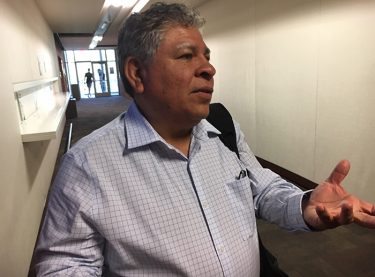
By Mike Kilen
GCU News Bureau
The answers were once clear. A student wrongs another, and the teacher hauls him to the office – perhaps issuing a suspension if it’s serious.
But legal and education officials are rethinking that discipline strategy as out-of-school suspensions increased drastically over the past 40 years, to dire effects.
Suspended students are less likely to graduate on time, more likely to repeat a grade, drop out and enter the juvenile justice system, according to federal Justice and Education Department research. Once there, the chance they become an adult offender rises by 50%.
It’s called the “school-to-prison pipeline,” said Kevin Walling, Chair of Justice Studies, Government and History at GCU. “This program exists to break that cycle.”
A pilot program that will use restorative justice methods to deal with disputes will launch in October, pairing GCU students in the College of Education and College of Humanities and Social Sciences with those at Desert Oasis Elementary in the Tolleson Elementary School District.
Fifteen GCU students were trained as mediators to lead the two parties – one harmed, one who did the harm – to talk about a resolution.
“It really empowers the students to come up with their own solutions,” said Art Montoya, Director of the Restorative Justice Center in Phoenix, which trained the GCU students. “They are so used to being told by adults. When you give them back the power, they really appreciate it.”

Restorative justice is a transformative way to look at disputes rather than the punitive model that mirrors the criminal justice system, when children only think “I’m in trouble,” he said.
“We are listening to each other, without interruption. We are not talking about who is at fault.”
The training is an important tool for GCU students who will be teachers. Classroom behavior issues can be a difficult part of the job.
“A lot of times students who do something and are suspended or expelled view it as a free day. This makes them more accountable,” said Dr. Marjaneh Gilpatrick, COE’s Associate Dean. “It’s non-punitive and it’s very Socratic, working together to find a solution.”
How it plays out was demonstrated recently in a GCU classroom, where students were taking a refresher training.
The group simulated a dispute between two young women – one who stole information off a test paper and one whose answers were lifted. The group described what happened without assigned guilt, figured out what could be done to make it right and decided what could be done in the future.
In this case, the person harmed was given an apology, the cheater promised to never do it again, to instead ask for help, and the teacher vowed to better answer questions about the test.
No one was suspended or sent to the office.
“I think there are a lot of kids turned away from education because of the way schools handle disciplinary actions,” said Paige Weinstein, a senior education major who acted as the mediator in the simulation. “When (students) have negative things going on in home life, it comes out in school. And school just sends them home; they are expelled or suspended. It drives them away from school, and no one finds out what is happening at home. With mediation, that stuff comes out. We get to talk about it and dive in and help students move forward.”
Gilpatrick said the training and the in-the-field experience as a mediator will benefit future teachers.
“We are in the process of reviewing the steps for offering a certificate of completion to GCU mediators who complete a certain number of hours of service and mediation,” Gilpatrick said. “That looks good on a resume. If you are a trained mediator, you are a commodity. Conflict is everywhere, not only in family, but in school and work environment.”
The same goes for justice students.
“I had to wait until I got to law school for mediation training. It’s something they will use in their careers,” Walling said. “There is a growing recognition that the punishment system isn’t working as well as they would like.”
Restorative justice isn’t about being soft, however.
“The criticism we get about it: ‘You are letting people off the hook.’ Actually, the opposite is true,” Montoya said. “You are holding people accountable for their actions, and you are putting it in writing, and they have to follow through.”
The parties are told the process is voluntary and is not a legal contract. It is presented to students as one of the options to resolve the conflict. The other options involve parents or the principal.
Once mediation begins, listening to each viewpoint and practicing empathy, or putting yourself in the other’s shoes, is emphasized. If it’s a success, a realistic plan that restores the relationship between the parties is drawn up.
It doesn’t always work and isn’t even tried for severe bullying or assaults, for example. But most discipline challenges in school don’t rise to that level, said Gisselle Herrera, Executive Director of Curriculum and Instruction at Tolleson Elementary School District.
It could have benefits for students beyond solving one dispute.
“It takes a lot more for people to agree, to take ownership and admit mistakes. But the vision is we are building a community of learners who can problem solve,” Herrera said. “Not only when they are in school, but beyond.”
Grand Canyon University senior writer Mike Kilen can be reached at [email protected] or at 602-639-6764.



































































